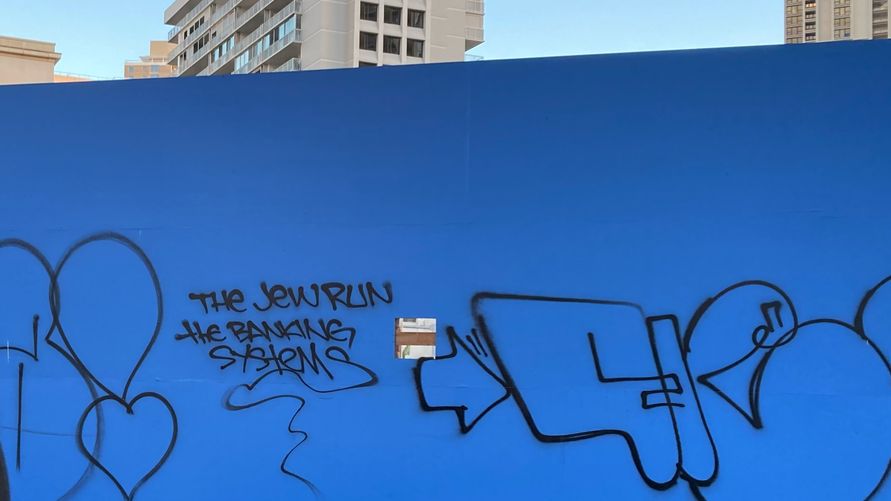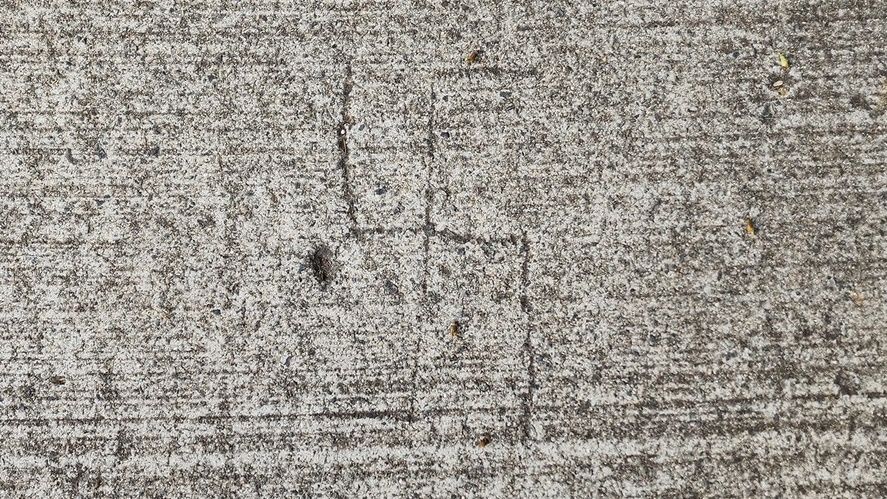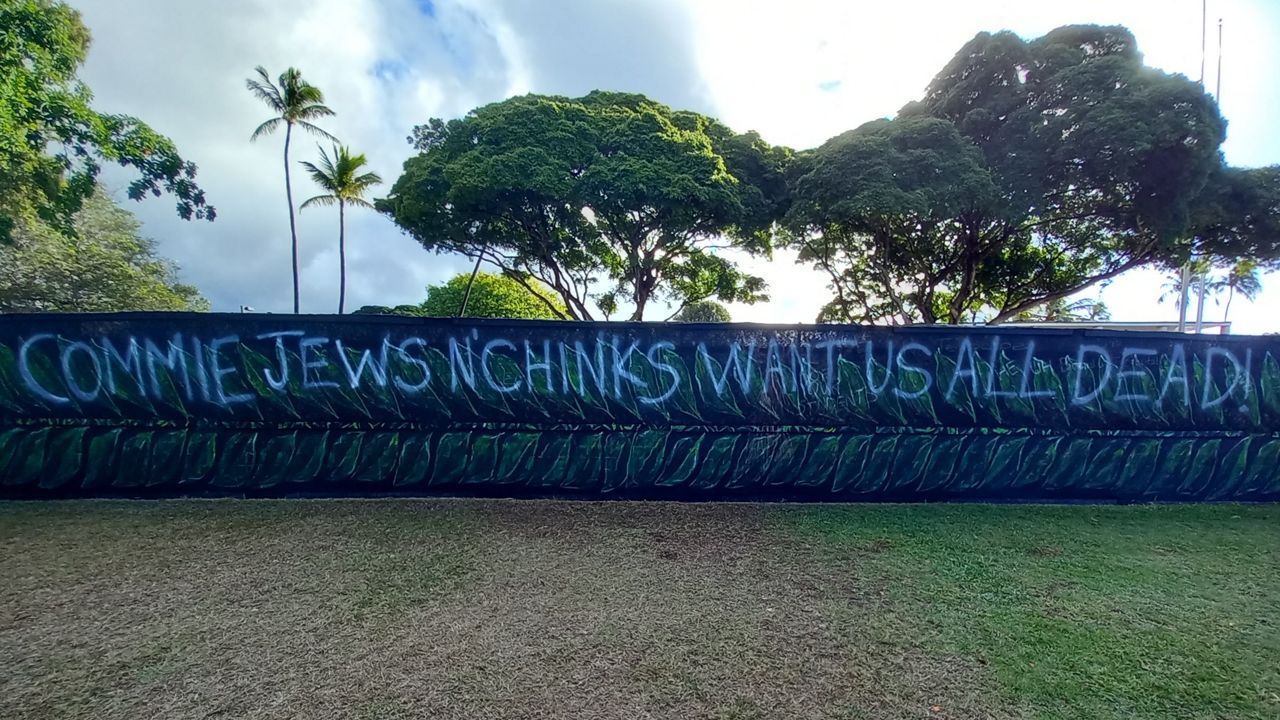HONOLULU — Daphne Desser was driving near the Hawaii Convention Center with her husband and children when she saw an antisemitic scrawl written on a temporary wall surrounding a construction site.
“The Jew run the banking systems,” the graffiti read.
Desser, an English professor at the University of Hawaii and a Jewish American who is the descendant of Holocaust survivors, said seeing the graffiti made her feel unsafe.
“In Honolulu, we normally feel so safe and secure … but it exists here,” said Desser, referring to antisemitism.
After researching what to do about the antisemitic graffiti, she returned to the corner of Kapiolani Boulevard and Atkinson Drive, called the police to file a report and photographed the vandalism so that she could send information about it to the Anti-Defamation League, a Jewish nonprofit that fights against bias and hatred of Jews.

An alarming increase in antisemitic incidents
An audit released by the Anti-Defamation League in March of recently reported antisemitic incidents in the U.S. showed that like much of the country, Hawaii has seen an increase in antisemitism. The ADL audit collects information from people who report antisemitic incidents through their website, law enforcement and news reports.
The ADL collected more antisemitic incidents of harassment, vandalism and assault throughout the U.S. in 2022 than in any year since 1979, when the ADL first started publishing an annual audit. In Hawaii, no antisemitic incidents were reported in 2018, 2019 and 2020, but in 2021, seven incidents were reported and in 2022 five incidents were reported.
ADL’s interim regional director Teresa Drenick said in an interview that the increase in Hawaii is alarming. Drenick acknowledged that Hawaii’s rates of antisemitic incidents are much lower than in California (518) or New York (580), but going from zero incidents to about half a dozen is cause for concern.
“Antisemitic incidents are on the rise in this state, and they're also becoming more publicly visible, which is very alarming,” Drenick said. “Nobody wants to drive down the street or send their child to a school where there are symbols of hate being so prominently displayed. It's terrifying.”
The ADL’s audit of antisemitic incidents in Hawaii includes a swastika that was etched into a memorial board near Pipeline; antisemitic emails that were sent to a Jewish family by their neighbors; swastikas drawn on a whiteboard at an elementary school and a similar incident at a middle school; antisemitic rants broadcasted on a public access television show on Hawaii Island; antisemitic voicemails that were left on the answering machines of Jewish individuals; flyers calling then-Lt. Gov Josh Green a Jew and a fraud; antisemitic and anti-Asian graffiti scribbled on the University of Hawaii at Manoa’s campus; antisemitic and anti-Asian graffiti scribbled on the University of Hawaii at Manoa’s campus; antisemitic emails that were sent to a Craigslist user; antisemitic comments made by an employee at a candy shop to a customer; and the graffiti that Desser reported.
What is contributing to the rise?
In the past few years, prominent figures have espoused antisemitism, including former President Donald Trump, who hosted a Holocaust-denying white supremacist at Mar-a-Lago, rapper Kanye West, who praised Adolf Hitler, NBA player Kyrie Irving, who promoted an antisemitic movie, and “the View” co-host Whoopi Goldberg, who said “the Holocaust isn’t about race.”
“It certainly can influence young people,” said Drenick about these celebrities expressing antisemitic views. “And it seems to allow people who have that sentiment within them the comfort … to now express it publicly.”
Along with the antisemitic vitriol coming from household names, Drenick also said Hawaii residents may be exposed to hate speech through social media and online video game forums.
Hawaii has between 8,000 to 10,000 Jewish residents, or 0.5% of the state’s population, according to a report from Jewish Community Services of Hawaii. Hawaii’s small Jewish community may mean that many in the general public don’t have Jewish friends, classmates or colleagues, and as a result lack understanding about Jewish people.
Mimi Lind, the executive director of the Jewish Community Services of Hawaii, said “a lot of antisemitism in Hawaii is based on ignorance because people have never met someone Jewish.”

Blatant and subtle forms of antisemitism
Bruce Fisher, a Jewish American who owns a travel company, is a resident of Hawaii Kai and he walks through the neighborhood every day. While walking on Lunalilo Home Road near the skateboard park, he passes two swastikas that are engraved in the cement sidewalk.
He described the Nazi symbols as “highly offensive.”
“They've been there for a long time,” said Fisher. “I've complained to the city a couple of times, and while they acknowledge it, they never do anything about it.”
Fisher said he first reported the swastikas in March. After Fisher and Spectrum News Hawaii followed up with the city in early May, the Department of Facility Maintenance dispatched a crew with grinders to remove the engravings. However, crew members said they were unable to locate the swastikas in the cement, but will go out again on Monday with Fisher.
While some antisemitism is overt and blatant, there are also covert or subtle forms of it.
“I hear people (in Hawaii) casually saying that Jews own everything. They're always rich and all these things, and it's just not true,” Fisher said.
Desser, the UH professor, described an incident from 2021 when one of her graduate students turned in an essay that criticized commonly told stories about World War II and the Holocaust, saying they only feature characters that are white.
“The misconception there … is this idea that the Jews are white,” Desser said. “It’s kind of an ironic statement given that the Aryan definition of this uber-race just excluded Jews; they weren't even considered human.”
In order to turn this student’s essay into a teachable moment, Desser shared with her class documentation from when her father entered Canada in 1939 after escaping the Holocaust, which shows he was referred to as part of the “Hebrew race.” Desser noted that classifications like “Hebrew race” are no longer used, but Jewish people in Europe were not considered white during the Holocaust.
“It's a lack of historical awareness of the context in which the Holocaust took place,” she said.
Antisemitism makes Jewish people in Hawaii feel unsafe
“When you experience an (antisemitic) incident, it's a violation, and it's an assault. It's an assault on your identity. It's an assault on your feeling of being safe in the world,” Lindsaid.
She said a tradition in Jewish culture is storytelling, and one story that is often discussed is that of the Holocaust.
“The Holocaust is in the front of people's minds as soon as anything (antisemitic) happens. The swastika doesn't just mean Nazis. It could mean death and murder,” Lind said.
She said all Jewish events held in Hawaii, whether at Temple Emanu-El or another venue, will have a hired armed security guard.
“The temple will always have a security guard. There's no Jewish event that doesn't have security. We have security for our annual fundraising dinner. And people don't feel safe without the security guard being there,” Lind said.
The Jewish Community Services recently started holding community gatherings in order to create “more safe spaces for Jews in Hawaii,” she said. “It doesn’t always feel safe.”
How to combat antisemitism
Drenick, with the ADL, said education is a key component to fighting antisemitism before “it can grow into something larger.” She urged people to learn about Jewish culture and the Holocaust.
Along with education, Lind encouraged organizations to create more opportunities to bring together the Jewish community with other communities in Hawaii. In particular, she mentioned the work of the Matsunaga Peace Institute’s Jews of Color.
“Recently, they brought the Jewish community and the Hawaiian community together to start a dialogue. I think the more that our communities are integrated and in communication, the antisemitism will decrease,” Lind said.
Those who experience antisemitism and are seeking help can contact the Jewish Community Services of Hawaii. Lind is a licensed social worker and will assess how someone is coping and whether a community response is necessary.
People are also encouraged to report antisemitic incidents to the ADL and to the police.
Most importantly, everyone — not just Jews — needs to speak out against antisemitism, advocates say.
“I think that people need to be brave and speak out. It should not fall just to the Jewish community to combat antisemitism,” Drenick said. “It's a pernicious form of hate, and all community members need to call it out and reject it when they see it.”
Michelle Broder Van Dyke covers the Hawaiian Islands for Spectrum News Hawaii. Email her at michelle.brodervandyke@charter.com.





